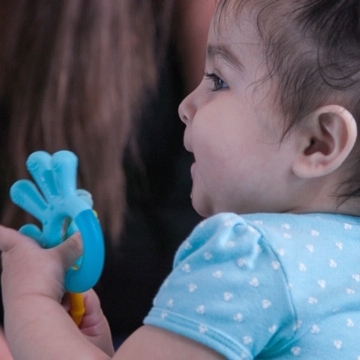New Mexico Approves Master of Science in Anesthesia Program at UNM

Six Tips to Help Keep Kids and Homes Together During the Pandemic
Of course, we all love our families. But after two months of staying at home the novelty has worn off for many of us.
A house suddenly full of two, three or four kids sharing space with adults trying to work can be a tough environment in which to keep cool. Things get loud. Kids cry, the internet connection snaps and you suddenly cannot remember the last time you ate.
"This is all new to everyone," says Dámaris Donado, acting director of Prevention Services at The University of New Mexico Center for Development and Disability. "But children need to feel like they know what is coming next in order to feel safe."
It sounds like rudimentary advice - but forgetting some rudimentary pointers can leave caregivers feeling frantic and children apprehensive. Donado offers some reminders that could help everyone relax.
First up - Routines, routines, routines.
"Often, parents will think, 'Well, just let them sleep.' But that can lead to bedtimes being later and meals off schedule and then suddenly, the entire house starts to break down. Keeping a regular routine is crucial," Donado says.
"Routines are what gives children a sense of safety, of knowing what comes next. It is especially important now that regular routines have been impacted by the fact that people aren't leaving the home to go to work," she adds.
A great deal of stress reduction starts with self-care.
Caregivers and kids need hot meals, and it is good to have an opportunity to be eating with children. In addition, it is important to stay hydrated throughout the day. "It sounds so basic, but it makes a huge difference throughout the day for emotional regulation," Donado says.
Social distancing does not mean social isolation - go outside and wave at the neighbors.
"We all need to be talking to each other more," she says. "While we can't congregate in groups we can still walk around the neighborhood and it is a good way to stay connected with each other."
Inside and Outside - Schedule unstructured playtimes for children.
"Kids need to play, that is an important way in how they learn," says Donado.
Incorporate kids into household chores.
"This really should be a priority," Donado says. "It cannot be that mom or dad are taking care of the house. That can be overwhelming, especially if there are additional people - from kids to aunts and uncles - who are now around during the day. The message should be, 'We all need to be in there cleaning up."
Bright eyes and nods of the head to contrary, remember that little ones may not yet grasp the concept of what it means "to pick up your bedroom."
"It is better to say, 'Now, we are picking up Legos,'" Donado says. "If they see you doing it, then they will start picking up Legos also and putting things away."
Finally, do not overdose on the news.
Donado recommends looking toward credible sources for information on COVID-19 and to remember that kids ages 3-4 should not be getting anything from the media, she says.
"Young children should only be receiving news from mom and dad, and it should be at a basic level. Tell them things like, 'We need to wash our hands because there are germs out there and washing our hands will keep us safe,' and then wash your hands too," she adds.
"The thing that they need to understand is that we are doing all of this because we love them and want them to be safe," Donado says.
About the UNM CDD Home Visiting Programs:
The UNM Center for Development and Disability home-visiting prevention services division has two free and voluntary programs for young mothers and families:
- The Nurse-Family Partnership program is for low-income women, 28 weeks pregnant or less with their first baby.
- Parents as Teachers is a program connecting women with early childhood professionals along the continuum from the prenatal stage through kindergarten entry.
The programs receive referrals from University of New Mexico Hospital, UNM clinics, managed care organizations and other providers. For more information on the programs, call 272-2271.